Thanks to the long-standing tradition of offering takeaway food, the branches of the Frankfurt-based snack bar chain “Best Worscht in Town” were able to stay open during the coronavirus crisis. And thanks to a KfW loan, the company will be able to tackle the challenges of the crisis even if things get worse.
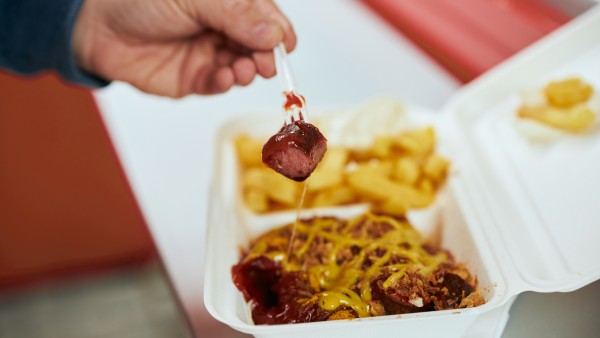
The currywurst chain’s recipe for success is a sauce to suit everyone’s taste.
For Lars Obendorfer, the fun stops at 1.2 million Scoville. He believes that anything significantly hotter is “physically harmful”. Scoville, also known as SHU, is a unit of measurement of capsaicin and is a familiar term to some connoisseurs of currywurst, a dish of sausage with curry ketchup. This is the substance found in chili peppers that puts the heat in the ketchup. The SHU scale at the currywurst joint “was introduced by me,” says 50-year-old Obendorfer. “They didn’t have it before.”
The fast food outlet on Frankfurt’s Grueneburgweg had long reached legendary status when Obendorfer took it over in 1994. His grandmother had opened it in 1970 under the name “Snackpoint”. Three years later, he began experimenting with spiciness. At first, he combined the spices himself using an enamel-lined concrete mixer. With the SHU idea, Lars Obendorfer became a true entrepreneur. The hot sauce was “our unique selling point,” he says. A star of Frankfurt’s gastronomic scene bestowed the title “ best worscht in town” on the offering at “Snackpoint”. Obendorfer took that distinction and used it to rename the business. In 2005, he founded his first branch in a Frankfurt shopping centre.
Today, the local celebrity with his light blonde hair and white glasses runs the “Best Worscht in Town” bratwurst sausage chain. He owns five branches in Frankfurt am Main himself. A further 21 franchises in Germany, primarily in Hesse, operate under the chain’s curly logo that can be read as a B or a W depending on how you look at it: B for Best and W for Worscht. On top of that, there are two shops in Dubai and one in the Saudi Arabian city of Jeddah.
Bratwurst, Rindswurst beef sausages, nine types of sauce with seven levels of heat, chips and farmhouse bread. That’s the entirety of Obendorfer’s fast food menu. This is typical fare in currywurst land, with – Obendorfer points to surveys in canteens – currywurst ranking among doner kebab and burgers in popularity.
And then coronavirus hit.
Read more under the image gallery.
The journey began in 1970 at the counter of the snack bar on Grüneburgweg in Frankfurt. Back then, the place was called “Snackpoint”.
Financial aid in times of crisis
“When it all started, my heart sank,” says Obendorfer. Back in March 2020, he immediately closed every branch. But after three days, he reopened all except those in shopping centres. They spontaneously decided to make their own plastic screens to protect against the virus. Just like everywhere else, only takeaway food was and is permitted during the periods of lockdown. Compared to other hospitality businesses, however, it obviously helps that fast food and takeaway go together like sausage and mustard.
Obendorfer estimates that his turnover has reduced by 30 to 40 per cent due to coronavirus. But he isn’t complaining: “We can live with that.” Best Worscht in Town has reduced its costs but has not had to put any of its 160 employees on short-time work. Sometimes franchisees paid themselves less, sometimes “nothing at all”, he reports. All this is, “bearable; there are people who have had it much, much worse.”
Naturally, Obendorfer does not know what will happen with the pandemic in future, whether some franchisees will no longer be able to pay for the goods or might even need to close. To prepare himself for these eventualities, the restaurant owner accepted when his bank, Commerzbank, offered him a KfW Entrepreneur Loan. Commerzbank and KfW “alleviated my fear” he says, describing the 150,000 euro loan, which was approved “quickly, without bureaucracy”, as “security”, as a “buffer”.
This is exactly what KfW coronavirus aid looks to achieve. “The favourable interest rate and the repayment-free first year create prospects even in a sector in which it is not easy to pay back yet another loan,” says KfW Director Markus Merzbach.
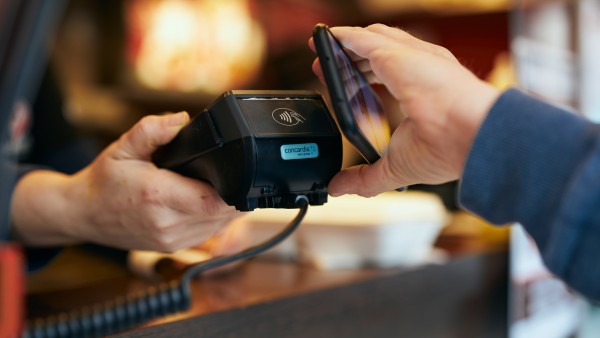
Even the small sum for fast food is paid using contactless payment.
Frankfurt, Kassel, Los Angeles
Only interest is paid during the pandemic, with repayments starting when revenue has recovered. “KfW can see the popularity of this concept in the high number of applications from the hospitality sector,” says Merzbach.
According to Michael Burk, Senior Corporate Customer Advisor at Commerzbank in Frankfurt, the bank’s many years of cooperation with Obendorfer has given them confidence in his business model. In times of crisis, close customer relationships such as that with Best Worscht in Town really come into their own. “The quick financing enabled the company to maintain its liquidity and invest money too, entering into new sectors,” says Burk, adding, “that’s what sets real entrepreneurship apart: not burying your head in the sand, but carrying on in times of crisis and adapting to the new situation.”
For affable, bustling Obendorfer, “the glass is always half full”. He sees opportunities in crises too. For example, you can lease shops “that you wouldn’t have come across otherwise”. At a time when hospitality is among the hardest hit sectors, Best Worscht in Town is continuing with its expansion. Two branches opened during the pandemic, in Offenbach and Giessen, with two more due to open in Kassel and in Baunatal. And currywurst fans in Los Angeles would have been able to get their hands on Best Worscht from this summer if the lockdown hadn’t forced the company to put the plan on ice.
Obendorfer has even been able to make a long-term project a reality in recent months: Best Worscht products are now available in Rewe grocery stores. Trials in the first few branches were so successful that the sausages and sauces are now sold in 300 of the supermarket chain’s branches, with this due to extend to all 564 branches in Hesse from April 2021.
Obendorfer hopes that the coronavirus situation will have calmed down again by next spring. He plans to grow Best Worscht in Town “slowly and healthily”. “If it works overseas, I’ll be delighted,” he says, “but the main thing is the German market.” What he has in mind is one or two branches in every major German city.
The sauce remains the trademark. But ultimately, it’s about the sausage. Best Worscht in Town also produces a non-spicy version. Those who want a plain sausage order a “naggische”, or “naked one” in Hessian dialect.
Published on KfW Stories: 9 Dezember 2020.

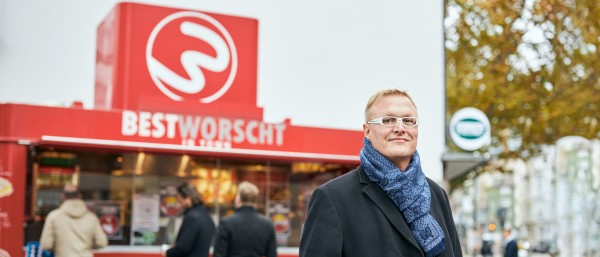
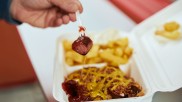

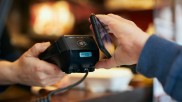
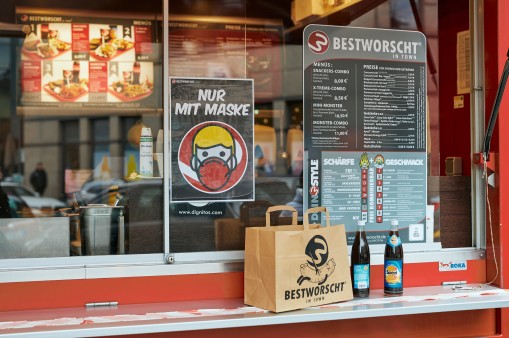
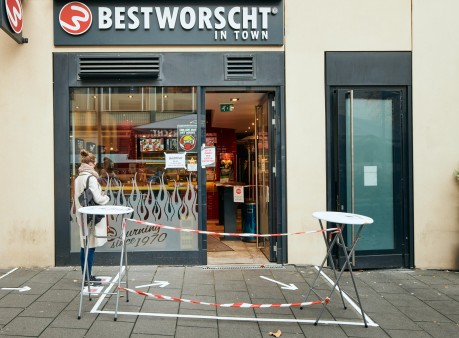
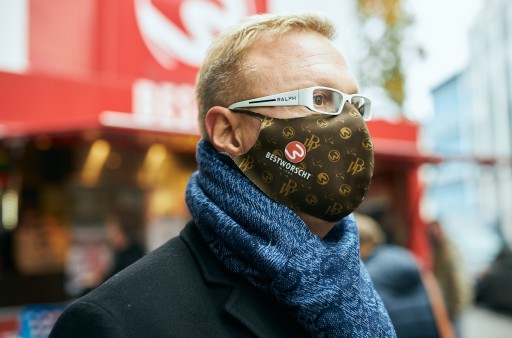
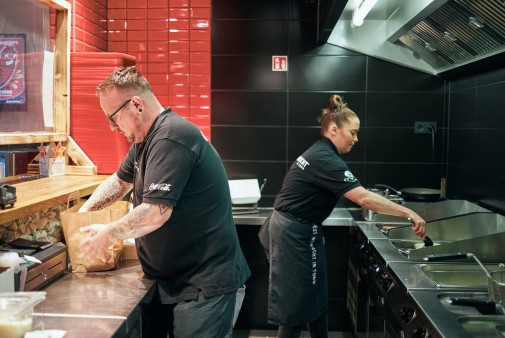
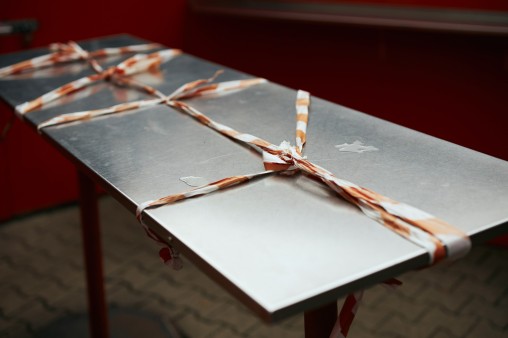





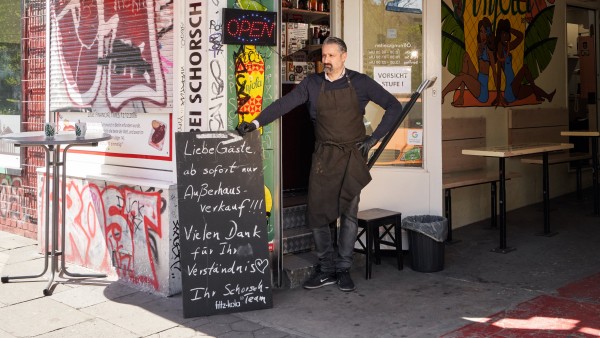
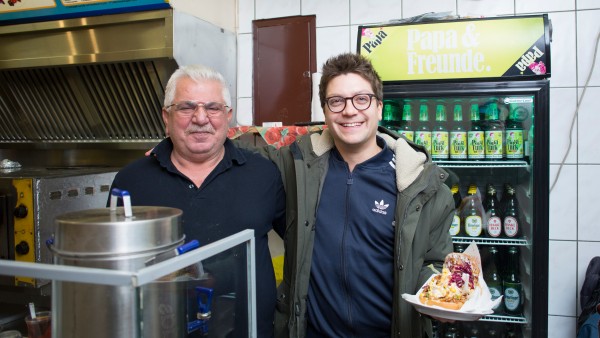
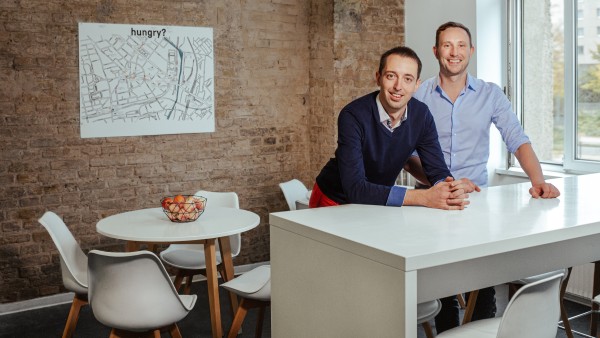
Data protection principles
If you click on one of the following icons, your data will be sent to the corresponding social network.
Privacy information